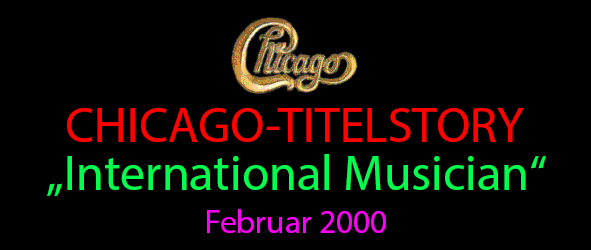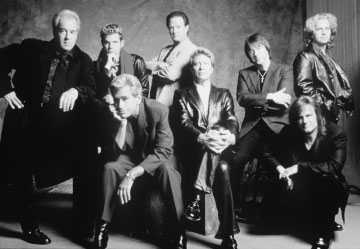


Chicago
Four Decades of Fans Say Chicago Is "My Kind of Sound!"
Few rock and roll bands can boast a career that spans four decades, and is rapidly spinning into a fifth. But one group that can unquestionably lay claim to that status is Chicago. The band was born in 1967, formed from an idea whose roots lay in uncharted territory–a rock and roll band with a horn section. Celebrating their 33rd anniversary this month, Chicago still stands strong and whole in the dawn of the year 2000.
Of the band’s seven original members, four remain in the group’s current eight member lineup: Robert Lamm on keyboards, Lee Loughnane on trumpet, James Pankow on trombone, and Walter Parazaider on sax. The four recently reflected with IM on their years in the music industry, the evolution of their band, and the role the union has played in their success.
The band’s latest release, Chicago 26, is their first live album since Chicago at Carnegie Hall, released in October of 1971. The album holds special meaning for the band, particularly as about 90 percent of the material included was recorded at "home" in Chicago. "There were about 40,000 people; it was the Taste of Chicago festival at the Jimmy Petrillo bandshell," says Parazaider. "We thought, ‘What better place to do this?’ It was pretty nice because it was a hometown thing. There were a lot of diehard Chicago fans and the feeling was just right. And when the feeling’s right, usually the playing is pretty good too. We got a lot of great material.
"When the whole idea came up a year ago," he adds, "someone asked, ‘How about a live album?’ and I said, ‘Well, we just did one of those,’ and they said, ‘Yeah … 28 years ago.’"
It isn’t surprising that the years may have blended together for Parazaider and his bandmates. The group has never been on hiatus, never taken even a year off. "It’s like one long tour that’s lasted about 32 years," says Loughnane. Chicago has kept a touring schedule every one of those years, producing 26 albums along the way, including 12 that charted in the top 10, and five of which were number one–not to mention 20 top 10 singles.
But just how does a rock band withstand the demands of that kind of schedule? No doubt it’s a matter of the unique dynamics of this collection of musicians. Chicago has always functioned as a democracy, says Pankow. "Communication is the foundation of any relationship," he says. "We’re constantly keeping the channels open so people can vent not only their ideas, but their concerns and displeasures. Even the newer members are encouraged to throw their two cents in. This band has always been a real band, you know? We sit around the table and hash it out."
Another key to the longtime cohesiveness of the group, says Pankow, is the lack of a frontman, a focal point calling the shots. Unlike the band Aerosmith, for instance–whose very name brings to mind an image of lead singer Steven Tyler–the name Chicago brings to mind, well … Chicago.
The united front of Chicago is something they’ve cultivated from the beginning, whether or not they realized it at first. From titling their albums with sequential numbers, to allowing the distinctive logo to dominate the cover of nearly every release, the members put the focus on the band as a unit. The result is that Chicago is more than a band–it’s virtually a brand.
And as happens with many enduring brands, it’s seen a lot of changes. What listeners perceive to be Chicago’s sound may vary some between generations. "The band started out much more experimental than it is now," says Lamm. "It became a mainstream band by the end of the ’70s. I think that’s when the horns began to be pushed into the background, and vocals and strings came to the forefront. I think that having a couple of hit singles in the late ’80s and early ’90s where there was no brass at all was a red flag. Since then, we’ve found a way to marry solid pop tunes while bringing the brass back to the forefront."
Pop radio had a hand in some of those changes too, says Pankow. "When ‘If You Leave Me Now’ was number one, radio decided that our niche was the power ballad, and we could’ve beat ourselves into the ground to get an uptempo song on the air. People who don’t come to our shows think we’re a ballad band. Then they come to a concert and say, ‘you guys COOK, you can play, you throw down!’"
The tragic death of guitarist and singer Terry Kath in 1978 and the arrivals and departures of several other band members have played a large part in the band’s evolution. "The different individuals that are in the band now, Jason Scheff, Bill Chaplin, Tris Imboden, and Keith Howland, have changed the sound somewhat," says Loughnane. "But it just takes on a new personality and I think that the ensemble we have together now plays better, more consistently, than any other we’ve ever presented."
The talent and stamina of this musical collective has earned them the respect and afforded them the freedom to explore avenues they might only have dreamed of in the late ’60s. In 1995, Chicago released Night & Day, an incredible collection of Big Band standards. "We were so very proud of it," says Parazaider, "because we just ‘Chicago-ized’ all these wonderful songs, from the tunes of Duke Ellington to Count Basie to Glenn Miller. We went ahead and put our own spin on them."
A year later, the band performed at the Hollywood Bowl with the Hollywood Bowl Orchestra, a massive undertaking that both energized and challenged them. "There was a fine line," says Loughnane. "The hardest thing was to play soft enough to let the strings get through–but it was so much fun."
Also in new territory for Chicago is the label they formed in 1995, Chicago Records, and its Web site, www.chirecords.com. Band members secured the rights to their original masters, and have since re-released them on their own label. The band’s 25th release, a Christmas CD, was the first new recording released on Chicago Records. Without a doubt, this accomplishment will pave the way to any other musical avenues Chicago chooses to travel.
But just as the band members revel in the freedom they now enjoy, it brings them to speculate on the fact that younger musicians may have to fight even harder than they did in the ’60s to attain that level of artistic freedom. "It used to be, when we came on the scene 30 years ago, it was music for the love of music," says Pankow. "FM radio played whole albums without commercial interruption. It was ‘Listen to this, everybody.’ Now it’s much more difficult for new artists coming out–music is not played for the joy of music, it’s played if it fits a format."
Parazaider agrees. "When we started, you didn’t get paid a lot–but you were showcasing your talent," he says. "And there was a time when record companies and promoters nurtured young acts, and you don’t see that today. They sign 100 bands, throw them up against the wall, and if one sticks–good. If you make money, fine. If you don’t, you’re out."
The harsh environment many artists face today is all the more reason for working musicians to look to the AFM as both a resource and an ally. "There are probably a lot of young people out there who say, like I did early on, ‘What do you need a musicians’ union for?’ When I was younger, we’d play these gigs where we would have been paid even if we didn’t have our union cards and we might have thought it was great. But it wouldn’t have been scale and it wouldn’t have been setting a standard. To tell you the truth, if you don’t have those standards, you’re going to lose out.
"Scabbing around for money seems good, it seems all right. But you know, if everybody did it, I think we’d all be shortchanging ourselves, and we’d be at the mercy of all these promoters to pay us what they want to. Right there is an important enough reason to join the union."
Another reason is to know you have some type of recourse in the face of a dispute. "There were times when I didn’t get paid for a jingle or a beer commercial I did," says Parazaider. "And the next thing I know, I did get paid, with the help of the union."
"It definitely safeguarded us," says Loughnane. "It felt like there was something behind us."
But Lamm points out that there is more to it than just protecting your wages. "It’s a resource for work, for jobs. And it’s also a forum for music itself, from a writing standpoint and an exchange of ideas standpoint. It’s a wealth of knowledge–a brotherhood … and sisterhood … of musicians. After the school systems, or university study if you’ve been lucky enough, there isn’t anything else like it. You need a resource like the people who make up the AFM for all of those things."
And while so many young artists idealistically think that they can just make music and everything else will take care of itself, it doesn’t quite work that way. Parazaider says it was his early union involvement that helped him and the band cope with the "business" end of the music business. "When we joined the union, we got an education, whether we wanted it or not. Let’s face it–when you’re young, you think you know everything and you’re immortal. That education really did help us all.
"It helped me to the point that I was booking the band when we first started. I worked with booking agents; I filled out contracts; I put in the benefits and learned all of the stuff that I wouldn’t have known unless I had been in the union. I had the chance to see it in action with other musicians and look over their shoulders when they did all of that. I learned the nuts and bolts of the music business because of Local 10 (now 10-208)."
All four of Chicago’s original members have been members of the union since the mid-60s. It’s a relationship they look upon with no small amount of pride.
"It’s the way I was raised," says Parazaider. "My dad’s a lifetime member of Local 10-208. He’s been a trumpet player for 65 years. I’ve been a member since I was 18. And although we all had to move out to the West Coast, we made sure we kept our Local 10-208 cards current."
"I appreciate the union being out there for us," says Loughnane. "I can say I have known all along that the union is there behind me, that I have a place to go to, a foundation to fall back on."
